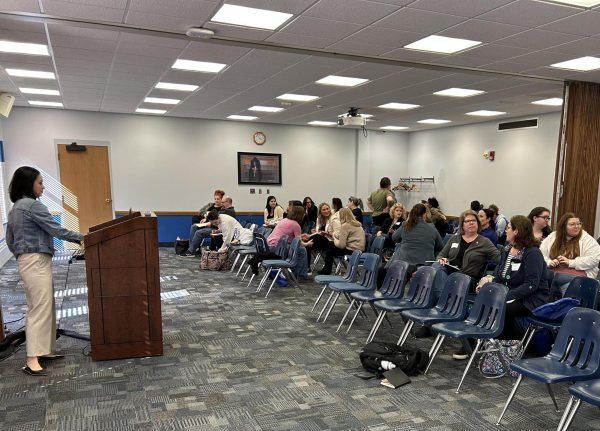Computer skills equal to knowledge
Being computer literate is a must, with computer technologies stretching from hurricane pattern prediction to rocket engine hearts, a visiting NASA administrator said in his presentation Monday.
John Ziebarth, deputy chief of NASA advanced super computing division, spoke on “NASA Technology and Education.”
He said his division at the NASA Ames Research Center in California, which supports computer science and computational technology, does research and development in the field of internal fluid dynamics, which is important in biotechnology as well as aeronautics.
A team from his division was responsible for the redesign of a temporary heart for patients in need of a heart transplant, Ziebarth said.
The temporary heart is basically a “rocket engine device,” he said, and it allows the heart patient to stay active while waiting for a donor heart.
He said the longest a patient has used the device was more than 120 days.
His division also has developed a new type of computer architecture that has been used to produce a high-resolution, moving picture that accurately predicted the movements of Hurricane Floyd, he said.
The division is continually looking for ways to improve technology, asking questions such as, “How do we network into deep space?” and “How do we make devices more compact?” Ziebarth said.
“We are still trying to find ways to compute faster,” he said.
Ziebarth also discussed technology’s relationship to education, noting that the undergraduate level is the most lacking in computer science education.
He said he has worked in successful programs such as the Aspire program, Adventures in Super computing and others implemented to get to computation into the science curriculum at high schools.
Kindergarten through 12th grade and graduate programs are more advanced with regards to computation education, but “undergraduates have always been a harder nut to crack,” he said.
He attributed the problem to money limitations, difficulties in finding qualified staff and already overly-extensive undergraduate requirements.
Experience with computer science has become a necessity in almost every field of study imaginable, Ziebarth said.
“Teachers go to school systems where everything’s wired and need training because they didn’t know how to use (the computer system),” he said. “We have to find a way to integrate that information into undergraduate programs.”










![[Thumbnail Edition] Charleston High School sophomore Railyn Cox pitches the ball during Charleston's 8-7 win over Flora High School on Monday, March 31.](https://www.dailyeasternnews.com/wp-content/uploads/2025/04/SBHS_01_O-1-e1743982413843-1200x1023.jpg)


![[Thumbnail Edition] Senior Foward Macy McGlone, getsw the ball and gets the point during the first half of the game aginst Western Illinois University,, Eastern Illinois University Lost to Western Illinois University Thursday March 6 20205, 78-75 EIU lost making it the end of their season](https://www.dailyeasternnews.com/wp-content/uploads/2025/03/WBB_OVC_03_O-1-e1743361637111-1200x614.jpg)





















![[Thumbnail Edition] Eastern Illinois softball senior infielder Briana Gonzalez resetting in the batter's box after a pitch at Williams Field during Eastern’s first game against Southeast Missouri State as Eastern split the games as Eastern lost the first game 3-0 and won the second 8-5 on March 28.](https://www.dailyeasternnews.com/wp-content/uploads/2025/04/SBSEMO_11_O-1-e1743993806746-1200x692.jpg)



















![The Weeklings lead guitarist John Merjave [Left] and guitarist Bob Burger [Right] perform "I Am the Walrus" at The Weeklings Beatles Bash concert in the Dvorak Concert Hall on Saturday.](https://www.dailyeasternnews.com/wp-content/uploads/2025/03/WL_01_O-1200x900.jpg)
















